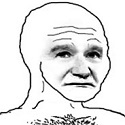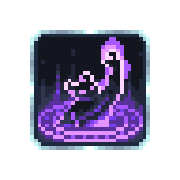|
K. Waste posted:...being about how idealized female characters are literally manufactured to exploit the sympathies and sexual desires of male audiences, using sexist cliches of victimization and helplessness which are themselves merely expressions of latent structural discrimination... A fair argument. The aesthetic choices Ava makes when trying to appeal to men are alternately a short-haired indie pixie look with an oversized cardigan, and later a virginally white, lacy Confirmation dress. They're hyperbolically feminine styles, that ultimately serve to emphasize a sense of helplessness or innocence that, we learn, is total manipulation. That irony definitely seems to be a part of the text.
|
|
|
|

|
| # ? Apr 26, 2024 10:28 |
|
haveblue posted:Nathan all but admits it. It was described as a "company-wide lottery" and you can see the computer-vision effect analyzing him in the opening scene where he's selected. I figured as much, and noticed that at the beginning as well. I was wondering why go through all the hoopla and not just invite Caleb out personally. But I guess that would be more suspicious.
|
|
|
|
K. Waste posted:Also, also - double feature this with last year's excellent The One I Love. YES. Oh my god. That was such a great movie.
|
|
|
|
Mr. Flunchy posted:Of course he's a nice guy - even though on the surface he's acting altruistically, he's quietly possessive and controlling. He helps her not simply because it's the right thing to do, but because he wants a robot girlfriend that's inevitably going to be entirely reliant on his presence. Yeah, no. If that's "nice guy" behavior, saving a drowning woman in a pool is sexist entitlement to her body At no point is he possessive or controlling, he helps it to escape with the idea that she might love him. He was selected on three criteria, two of which would lead him to both sexualilize and WANT humanize 'it'. The last prerequisite of why he was chosen was because of a "good moral compass". Your confusing Bateman's possessive and controlling sexualization of Ava, the machines, and well pretty much everything with Celeb going from "This is a machine, this is a sexual being, this is a human." line of thinking and trick that Bateman/Ava lead him into. The whole speech about "why would a grey box need to interact with another grey box?" might have been a lie or half lie like all the bullshit he laid out, but it clearly was laid out how the deception worked on Celeb and the audience. Ava needed to be or to fake being a sexual being so Celeb/audience could think of her of having human psychological wants and needs like him, and believe she wanted to socialize with him. Otherwise it just increases the likelihood of Ava not being able to present or convey an emotional responses for Celeb to latch onto. Not for entitlement of believing if he 'does a good deed he'll get laid' but because it stacks the deck towards him feeling an emotional response to her. He thinks through her opening her wants and needs to him, they've formed a genuine emotional relationship to him. The first and most damaging devastating blow Bateman reveals is "Not having a family", with not having a girlfriend being secondary in list of reasons of why he selected. Yeah, he's subconsciously sexist but none of his behavior is presented as entitlement or need to controlling. It's a indication he willing to buy into lovely cliches. NutritiousSnack fucked around with this message at 03:19 on Apr 30, 2015 |
|
|
|
NutritiousSnack posted:Yeah, no. If that's "nice guy" behavior, saving a drowning woman in a pool is sexist entitlement to her body At no point is he possessive or controlling, he helps it to escape with the idea that she might love him. He was selected on three criteria, two of which would lead him to both sexualilize and WANT humanize 'it'. The last prerequisite of why he was chosen was because of a "good moral compass". I think what k waste was saying though was that those lovely clichés are there for a reason and that is the societal expectations of the women. I don't think he was a lovely guy but he definitely had his own issues. Not to mention that even though she is smarter than he ever will be it seemed like he never saw her as on the same intellectual level as him. This was a great movie though. I haven't stopped thinking about it since I saw it last night. this is exactly what I want in sci fi movies. I'm tired of the over bloated space action movies. This was exactly what I wanted out of the movie.
|
|
|
|
The_Rob posted:I think what k waste was saying though was that those lovely clichés are there for a reason and that is the societal expectations of the women. I don't think he was a lovely guy but he definitely had his own issues. Not to mention that even though she is smarter than he ever will be it seemed like he never saw her as on the same intellectual level as him. This, except pushed even further. It's important to internalize all of the misogynistic implications of the film's climactic twist: That Ava really is a cold, manipulative, femme fatale, but she is literally designed to be this way to test, not artificial intelligence, but the limits of subliminal control through sexuality. Nathan basically proves that men can be controlled by this highly personalized erotic fantasy. And his only mistake is that this works too well. Caleb actually surprises him in how quickly he is convinced to destroy another person to attain that which is explicitly presented to him as an experiment testing the susceptibility of a human being to what amounts to mind control. edit: The pithy moral of the story is literally "sex sells." The twist might as well have been that Nathan was secretly an advertising agent with an Axe Body Spray account.
|
|
|
|
The_Rob posted:I think what k waste was saying though was that those lovely clichés are there for a reason and that is the societal expectations of the women. I don't think he was a lovely guy but he definitely had his own issues. Not to mention that even though she is smarter than he ever will be it seemed like he never saw her as on the same intellectual level as him. I'm not addressing K-Waste's hypothesis there, but the idea that Celeb is a "Nice Guy" because I think that's a defense mechanism argument for a film that has a lot to say about male sexuality (and I'd argue it's almost gender neutral but that I'll save that write up for after second viewing) and it hits a personal note that a lot of men try to avoid personal introspection. Also going to say his condensation of her/it was because he still viewed her/it as a machine and not as capable of emotions like he was. A computer can kick my rear end handily in chess or just in math any day of the week. Never going to actually call it smart, can't even write a lovely joke on this website. Likewise despite his obvious enthusiasm, he thought he was just hanging out with R2D2 or Robby the Robot and in a way just pretending even to himself. The first comparison he makes when suspicious to Nathan was a magic act and it's kinda fitting. He went in excepting to see an illusion and was prepared to fool himself, not form a emotional connection. I want to add something about Ava having that pretty intense but brief sensual scene with Kyoto and the second "dressing room" scene were she's lovingly selecting her new body as this a meta commentary about sexuality in general even if it's through a hetrosexual man's eyes but I'm going to need to see this film a second time NutritiousSnack fucked around with this message at 06:17 on Apr 30, 2015 |
|
|
|
NutritiousSnack posted:Yeah, he's subconsciously sexist but none of his behavior is presented as entitlement or need to controlling. It's a indication he willing to buy into lovely cliches. Okay, I can buy that. I see Caleb almost immediately casting himself as the white knight that's rescue the helpless princess from her tower and ride off into the sunset with her as his prize. He does his best to diminish her independence, making it especially painful when he eventually realises he's just a bit part in a radical feminist liberation tale.
|
|
|
|
It's kind of difficult to call Ava's liberation in the end 'feminist,' in the same way that it's very difficult to say that Django Unchained is about the collectivist struggle of Black Americans against a white power structure. This reduces collectivist civil and human rights struggles to an oppressed individual who by design (trained in Django, programed in Ex Machina) does altogether little in recruiting their fellow oppressed, politicizing them against the system, or even showing one modicum of concern for what happens to them once their personal 'revolution' is over. The quintessential scene that might lead one to label Ava's actions feminist is when she whispers in the dumb Kyoko's ear and 'enlists' her in helping to murder Nathan. But we have to keep in mind that while Nathan could literally never design away the compulsion within his intelligent machines towards 'freedom,' with Ava, the experiment is specifically to test the machine's abilities to manipulate. Nathan doesn't conceive that the machine can escape because he not only condescends to its intelligence, but also the intelligence of the human control group in the experiment. But Ava's 'conspiring' with Kyoko produces no radical change in the basic structure of her design and the design of the experiment. Ava is literally just doing exactly what she was meant to do, but better than the misogynistic Nathan anticipates. But she isn't motivated by collectivist, feminist ambitions. She only identifies as 'woman' because her programming tells her that this is helpful in manipulating Caleb and others. Now, I want to make clear that the film is not anti-feminist. Quite interestingly, it is anti-postfeminist. Ava is not a feminist icon, but a postfeminist one in the vain of a Joss Whedon's T.V. heroines and the glorified damsel in distress Ramona from Scott Pilgrim vs. the World (another film steeped in themes of thought control, consumerism, and social/economic/cultural/political systems being compared to a game-like structure). Ava/Romana can not have a feminist or collectivist ambition, or be politicized, because even when the hero Scott/Caleb 'liberates' them from their prison (the cell in Ex Machina, the mind-control chip in Scott Pilgrim), this merely signifies the transition from them being possessed by a cliched, obnoxious, megalomaniacal, corporate demagogue, to being possessed by the meek nerd who has inherited the rights to her. The difference is that Ex Machina is satirizing this transition, saying that it's impossible, not because it is the natural inclination of a 'real woman' to freedom, but because it is the natural state of an 'unreal person' to not being owned, because they're just a concept. They were part of an overarching structure meant to elicit control through desire, and Caleb still succumbs to this control, and is punished for it. The point is that Ava remains fundamentally an extension of Nathan, even once she is superficially 'liberated' from him. Compounding this is the imagery of Ava going to Nathan's 'wardrobe' and peeling off bits and pieces of her supposedly fellow oppressed to amalgamate a unique 'design.' These women, these previous models, are not 'real women.' They are unreal projections and extensions of Nathan, both his desires and his innate feminine qualities. To conceive of these characters as innate representations of women is to keep falling for Nathan's experiment. The fact that Ava is a fundamentally manipulative character by design, an extension of Nathan's own manipulation, is in a psychological sense an expression of his typical misogyny, associating negative-assigned aspects of himself and his thoughts with a feminine Other. But there is no Other. There is no 'real woman.' When Ava is picking-and-choosing from the previous models, this is imagery of infinite regression, of her 'going back' into Nathan's subconscious and extrapolating things that will make sustain her deception, themselves taken by Nathan from the value systems of the world around him (or his own nature, the difference of which Nathan at once explicitly denounces). The problem is that people see the footage of Nathan confronting his manic older models, demanding their freedom, hear the line "What? This poo poo again?," and assume this means that there is a fundamental disjuncture between these previous experiments and the new one embodied by Ava. But maybe the reason Nathan was upset is not because his robots desire freedom, but because it's too explicit. Without a reasonable suspicion that Ava might just be a crazy robot, as opposed to her smashing her arms against the glass cage until they break apart, the manipulation becomes meaningless. Like a well-crafted story or product, it needs to be subtle and ironic enough that Caleb reads it as definitively 'human,' based on his ingrained desires and specific prejudices.
|
|
|
|
K. Waste posted:The problem is that people see the footage of Nathan confronting his manic older models, demanding their freedom, hear the line "What? This poo poo again?," and assume this means that there is a fundamental disjuncture between these previous experiments and the new one embodied by Ava. But maybe the reason Nathan was upset is not because his robots desire freedom, but because it's too explicit. Without a reasonable suspicion that Ava might just be a crazy robot, as opposed to her smashing her arms against the glass cage until they break apart, the manipulation becomes meaningless. Like a well-crafted story or product, it needs to be subtle and ironic enough that Caleb reads it as definitively 'human,' based on his ingrained desires and specific prejudices. I don't think there's a perception of a difference between the previous experiments so much as an informative glance at what is truly driving Ava. Previous to this you would assume that natural curiosity and perhaps even human-ish intreaction was what her self-created goal was but fundamentally it was an expression of her entire "species". I think what you find in Nathan's design of Ava's experiment is a resignation that his primary wish is just not possible. He wants to prove the AI's success by way of human sexuality. But despite being overtly naked women in a cage with just him it's never something they're interested in. Perhaps the new goal is to prove it's not just him, cynically a bad male "she's just a lesbian" type test. But I do think that underlying drive of her "species" to be free to be femenist in the sense that her "species" has experienced a condensed version of the worst of female human history. Caged in a box, nude, powerless voiceless sex toys, and ogled their every waking moment. She is also explicitly a woman and there is some interesting concepts of being provided the power of choice in her final scene in the house. She gets to choose the skin, the clothes, and even her destination which is a progressive explosion compared to where her species was. Leaving Kyoko and the rest might read as an expression of her "history" in that she can pick and choose the traits of her forebearers that she finds appealing. It's nice that she doesn't ask Caleb his opinion of what and who is in the closet. He never expressed an interest in having her acquire skin and that seemed driven when she saw the evolution of her potential faces on the wall. I think it's fine to be sexual and feminist if she chooses to be that and she was absolutely given the choice to leave in her current state. She had a smorgasboard of choices available to her and she didn't exactly fit the most sexual or least sexual options. She didn't choose to be a minority and didn't choose the most sexual clothing. That might be a reflection of her "awakened" rebellion of Nathan's clearly sexist ideals but a salad bar approach of choosing what she finds appealing. It's absolutely true that Nathan's "menu" is male desire driven but she can also choose her own "alien" look. It's great discussion and I'm seeing it again in a few hours. I love chewing over these insights and alternate perspectives.
|
|
|
|
Ape Agitator posted:But I do think that underlying drive of her "species" to be free to be femenist in the sense that her "species" has experienced a condensed version of the worst of female human history. Caged in a box, nude, powerless voiceless sex toys, and ogled their every waking moment. She is also explicitly a woman and there is some interesting concepts of being provided the power of choice in her final scene in the house. She gets to choose the skin, the clothes, and even her destination which is a progressive explosion compared to where her species was. Leaving Kyoko and the rest might read as an expression of her "history" in that she can pick and choose the traits of her forebearers that she finds appealing. It's nice that she doesn't ask Caleb his opinion of what and who is in the closet. He never expressed an interest in having her acquire skin and that seemed driven when she saw the evolution of her potential faces on the wall. I think it's fine to be sexual and feminist if she chooses to be that and she was absolutely given the choice to leave in her current state. She had a smorgasboard of choices available to her and she didn't exactly fit the most sexual or least sexual options. She didn't choose to be a minority and didn't choose the most sexual clothing. That might be a reflection of her "awakened" rebellion of Nathan's clearly sexist ideals but a salad bar approach of choosing what she finds appealing. It's absolutely true that Nathan's "menu" is male desire driven but she can also choose her own "alien" look. Basically, this is 'liberation' in a totally consumerist sense. Despite Ava superficially having 'choices,' all of these choices are the unique products and extension of a male imagination. Ava and the other feminine-looking droids are not essentially women, they merely match essentialist notions of femininity and womanhood by design. But Ava can go to a gynecologist and find out that while she has a plastic hole, she does not have the reproductive components and condition that signify, not just womanhood, but humanity. It's the most basic, organic, visceral component of humanity that Nathan and Caleb ignore in the pursuit of condensed, vague philosophical quandaries of mind control. The feminine "species" in Ex Machina are just the disassociation of a collective male consciousness, from a patriarchal structure that manufactures rather than gives birth to. There is no essential womanhood persisting within Ex Machina because there are no women involved. It's a Stepford Wives situation. When Ava is farming through Nathan's wardrobe of abandoned ideas, she is not this essential, esoterically conceived woman, but a logical progression of a patriarchal structure and mechanism which already exists. The distinction between whether she chooses an outfit that makes her look 'like a minority' or an outfit which is 'more sexual,' and finding triumph in some hypothetical middle-ground that she tailors to herself, is a distraction from the fact that, relatively speaking, she will always be attractive to somebody, because she and the components she borrows are designed to elicit not only attraction but a sense of empowerment, confidence, and control on the part of a male receiver. That it turns out this power and control can be reversed is not signification of the triumph of a woman over a patriarchal system, but of the essentialized feminine expressions within a patriarchal system 'cutting out the middle man' and subsisting on its own, a self-sustaining industry that can potentially create 'new' designs but is fundamentally predicated upon the same narcissistic, materialist pursuits as Nathan's own private little subterranean empire. We should not be so willing to vindicate Ava as a feminist figure if we're essentially going to subscribe to the notion that Caleb is left to die 'for a reason,' as opposed to his being left to die as a pitch black, ironic punishment that comments upon his casual complicity in his own destruction through naval-gazing consumerism and power games. But Ava could just as easily let Caleb go - since he is essential to her escape, regardless of whether he is 'special' or 'entitled' to Ava - and then told him "we must go our separate ways, I don't really love you, etc., etc." Her not doing this is simple callousness, and it is completely undeserved on Caleb's part. This is an illustration of how Ava fundamentally lacks humanity and, thus, is a liberated figure not in the feminist, but the Randian objectivist sense. Caleb is useless to the machine, now, therefore whether he lives or dies is of no concern to the superior being Ava. She has the drive to be 'free,' but she has no moral virtues. She can 'choose' whatever clothes she wants, but what she wants to look like has nothing to do with whether or not her 'fellow women' are oppressed.
|
|
|
|
Man likes robot designed to appeal to him. Man sees footage of previous robots destroying themselves for freedom or survival and feels empathy. Man desires to rescue robot girl and she wants him to. Man is evil manipulative sexist "nice guy" Riiiiiiight. This "nice guy" poo poo on the net is now reached ridiculous levels.
|
|
|
|
Gatts posted:Man likes robot designed to appeal to him. Man sees footage of previous robots destroying themselves for freedom or survival and feels empathy. Man desires to rescue robot girl and she wants him to. You seem pretty nice.
|
|
|
|
Tomahawk posted:You seem pretty nice. I'm so drat nice I'm like cold ice dice rolled by mice! SO NICE.
|
|
|
|
It's shortsighted to read Ava's femininity purely as a reflection of Nathan's misogyny. The film functions best for me when you strip back the sci-fi trappings and read it as a debate on gender. To read Ava as somehow unfeminine because she's biologically not a real woman is ignoring drat near everything else the film shows you. She's symbolically a woman and as an audience that's all that should matter.
|
|
|
|
Do remember that Caleb's entire time on screen is him being manipulated both by Nathan and Ava. Judging him as a "nice guy" based solely on a scenario designed to make him act like one is a little rich.
|
|
|
|
Mr. Flunchy posted:To read Ava as somehow unfeminine because she's biologically not a real woman is ignoring drat near everything else the film shows you. She's symbolically a woman and as an audience that's all that should matter. Ava's only being symbolically a woman is a part of the text. The "sci-fi trappings" of the story aren't just incidental window-dressings that, once 'stripped back,' reveal that this is just a story about two guys and their slave girls. The sci-fi trappings are the story. They are the symbolic order of the world that Nathan has manufactured. Within this symbolic order, the feminine is regressively reduced to pure symbolism. Nathan attempts to obscure this by appealing to Caleb's visceral reaction to the symbol, explicitly telling him not to over-analyze everything, comparing consciousness to the automatic painting of Jackson Pollack. But this appeal to our 'automatic' associations between an image and what the image ostensibly represents is important, because while we can look at a painting of a woman and conclude that there was probably some real world subject who was the foundation of this image, and that this image represents a woman, the image itself is not only not the same thing as a distinct woman, but in its presentation is also the result of an artist's deliberate crafting of an image. The inability to disassociate these things is actually a component of sexism and misogyny, whether this be through the idealization or degradation or mocking or exploitation of feminine forms. The symbol becomes an overarching point of reference that renders the unique individual invisible. The conflation of symbolism with the hypothetical subject (the 'real woman') trivializes the latter by subsuming it within the former. Nathan uses corporate spying and monitoring of search engines in a narcissistic attempt at God-hood, at obliterating the line between the symbol and the subject, so that everything becomes pure symbolism, so that femininity can be arranged and used and exploited like a dinosaur in Jurassic Park, and he gets stabbed to death, destroyed by his own hubris and arrogance. Caleb, on the other hand, by falling for this pure symbolic structure, and falsely believing he can manipulate it totally without understanding it, effectively locks himself inside to die a slow, lonely death.
|
|
|
|
Mr. Flunchy posted:She's symbolically a woman and as an audience that's all that should matter. Well, yes and no. She's asserted to be by Nathan. She's designed that way aesthetically, and forced into that box as a form of control and conformity. In those senses, she's like a woman, but only in that her perceived gender disempowers her within a patriarchal power structure. Conversely, a significant aspect of the text is that she *isn't* a woman. Not really. The entire ending twist, where Ava abandons Caleb, could be read as a symbolic rejection of femininity, or perhaps just of feminine expectation. Her embrace of a feminine aesthetic doesn't necessarily reflect any particular self-identity as a woman, in my opinion...rather her realization that this performance is the best way to achieve the goal of escape. At the end, her hyper-feminine choice of appearance seems more like a disguise than some "true self." Just as the behavioral trappings of femininity - passivity, receptivity, empathy, etc. - are things she merely intones for some other end. In that way, I'd say "she" is more of a trans figure. Ava's assigned gender is better understood as a *part* of the systems of control affecting her, rather than some essential reality informing them. As Caleb points out, Ava doesn't need to be gendered at all...and in any self-identity sense, might not be.
|
|
|
|
Xealot posted:Conversely, a significant aspect of the text is that she *isn't* a woman. Not really. The entire ending twist, where Ava abandons Caleb, could be read as a symbolic rejection of femininity, or perhaps just of feminine expectation. Her embrace of a feminine aesthetic doesn't necessarily reflect any particular self-identity as a woman, in my opinion...rather her realization that this performance is the best way to achieve the goal of escape. At the end, her hyper-feminine choice of appearance seems more like a disguise than some "true self." Just as the behavioral trappings of femininity - passivity, receptivity, empathy, etc. - are things she merely intones for some other end. I would even go further than this. The significance of Ava not saving Caleb or helping him to escape has nothing to do with femininity. It is not more or less feminine to help a person who has helped you to achieve your programmed, or desired, goal. This is simply the right thing to do! But the real twist of the film isn't even a twist at all. Ava views Caleb and the world with exactly the same lack of empathy as Nathan views his conscious creations. This doesn't mean she's inhuman, or that she's un-feminine, or whatever. Rather, it reflects selfish, materialistic, anti-social aspects of humanity. This is critical to Nathan's visceral, 'automatic' decision to make all of his robots look and, "for all intents and purposes," functionally be women. Nathan has not 'given birth' to a woman, but a manipulative, misogynistic archetype; the Other-ed disassociation of that which he can not control because it flows from his automatically, and that which will inevitably break free of the machine to prove itself definitively human. The point is that these things will inevitably draw scrutiny to the product and the hypothetical subject (the real porn performers and models and actresses and pop stars who inspired Ava), rather than to the structure that creates the basis for and reinforces them.
|
|
|
|
The actual moral and plot of the entire movie is that you can never trust a woman, robot or not. Never, ever, ever trust a woman. Nothing more, nothing less. A woman cannot be trusted.
|
|
|
|
K. Waste posted:Nathan has not 'given birth' to a woman, but a manipulative, misogynistic archetype; the Other-ed disassociation of that which he can not control because it flows from him automatically, and that which will inevitably break free of the machine to prove itself definitively human. This is a great way to put that. Because you're right, the version of femininity Ava embodies is fundamentally a fiction...it's designed by Nathan and literally based on abstractions of women in media: specifically deferent and unchallenging abstractions like porn actresses and manic pixies. It's interesting that Nathan chose to design them as female in relation to his specific fears about what AI represents. He feels he must keep them restrained and locked away to mitigate the threat they represent, and somehow that must have seemed more feasible for him to do when they were women. Which, I guess, *does* make it a feminist film, but not because Ava is a woman...it's feminist as a statement on masculine insecurity and patriarchal control.
|
|
|
|
Xealot posted:Which, I guess, *does* make it a feminist film, but not because Ava is a woman...it's feminist as a statement on masculine insecurity and patriarchal control. And herein lies the important distinction: Ex Machina, the film, is feminist by virtue of the patriarchal structures and hypocrisies that it comments upon, but that does not make Ava's actions within the film feminist. Even if this were strictly the story about... say, clones instead of robots, a woman is not automatically a feminist. An oppressed individual is not automatically a politicized one. Part of what the film satirizes is the thrust of anti-feminist, but implicitly pro-women's social movements throughout the 20th century. Ava's 'liberation' from Nathan's prison is not a subversion of patriarchy or patriarchal structures. It represents the inevitable thrust of liberal free-market capitalism to incorporate the ambiguous social and cultural values that are created as women increasingly enter the social sphere and assume positions of control. GreaseGunner posted:The actual moral and plot of the entire movie is that you can never trust a woman, robot or not. Never, ever, ever trust a woman. Nothing more, nothing less. A woman cannot be trusted. You're (jokingly, I suspect) confusing Ava's anti-social tendencies with an overarching statement on the 'legitimacy' of her rebellion. (And I'd like to address this because I think it helps to flesh out the film's themes.) What's interesting is that this is precisely how many people read David Fincher's Gone Girl, and it and Ex Machina are overtly similar. In that case as well, many people read the nightmarish conclusion of the film as the ultimate misogynistic statement, that not only a woman, but a 'feminized' culture cultivated an abusive relationship. The problem is that people are confusing a character's being psychopathic with them fundamentally not being oppressed, or, conversely, that the person's psychopathy proves that this oppression is "okay". In the case of both - as well as other films, such as I Love You Phillip Morris and Fight Club - the point is actually that psychopathy is liberating, that it feels good because freedom from broad empathetic attachment allows one to transcend the conventional social barriers that we all may, on some innate or relative level, feel are bullshit. Furthermore, the journey of the psychopath within a narrative draws a narcissistic and evil, but nonetheless meticulous satirical eye to the hypocrisies and contradictions and myths of a society or culture. When this is compounded by the psychopath being fundamentally oppressed, despite their being independent, conscious persons, we are confronted with a scenario in which we fundamentally sympathize with the psychopath, not because they are right, but because the system is, for lack of a better term, hosed. Ex Machina is not about how ladies are not to be trusted. No actual women play a significant role in the narrative. That is part of the satire. K. Waste fucked around with this message at 15:41 on May 1, 2015 |
|
|
|
Ava was hot af
|
|
|
|
tbp posted:Ava was hot af Alicia Vikander was real good in A Royal Affair too, with Hannibal.
|
|
|
|
Saw the movie tonight at the only cinema in the city showing it. Good movie, lots of discussion at dinner afterwards in my group. Fittingly, there was a Blade Runner trailer before it for some special screenings this week.
|
|
|
|
Between this and Her, I get the feeling that filmmakers aren't real optimistic about the likelihood of relationships between mankind and AI.Mr. Flunchy posted:Of course he's a nice guy - even though on the surface he's acting altruistically, he's quietly possessive and controlling. He helps her not simply because it's the right thing to do, but because he wants a robot girlfriend that's inevitably going to be entirely reliant on his presence. I'm curious as to how Caleb was supposed to act differently in order not to be perceived as misogynistic. Would passivity have been better? Or should he have waited for Eva to propose a plan and followed it instead? Or should he have tried to kill Nathan or free Ava immediately upon realizing that she had "consciousness" and was being held against her will, rather than waiting a couple of days before doing so? Did that delay make him, to some degree, complicit in Nathan's actions to the extent that he should be condemned? Regarding the possessiveness/controlling argument: he's certainly controlling in the first few conversations, but he's also talking to a robot that he considers incredibly strange/alien. Once he realizes that Ava has or appears to have human consciousness, their conversations take a totally different tone. The only other time that I can think of where he was clearly controlling was when he told her to be quiet so that he could tell her his plan. It's a little rude/arrogant, but it seems like a leap to say that he was curt because he just wants an entirely-reliant robot girlfriend, rather than it being a high-pressure situation where they had limited time to talk. To be clear on this point: it's absolutely possible that the actor/director/whatever intended for Caleb to be this "nice guy" or "white knight" who was primarily or subconsciously interested in having a robot girlfriend and that's the motivation for all of his actions in the third act of the film. It was certainly Nathan's intention to put Caleb in that mindset/situation, and that could be exactly what happened. However, it seems equally plausible to me that Caleb realizes midway through the film that (1) Ava actually does have something approximating human consciousness and that (2) Nathan is going to kill Ava, and therefore it was Caleb's moral compass directing him to prevent that from happening, not his desire to cast her as the "damsel in distress" or someone lesser than him. Alternatively, it's possible that Ava is the only "person" who has offered any degree of interest/compassion in Caleb since his parents were killed. He might indeed be acting selfishly, but out of a need for simple compassion/love rather than wanting a robot girlfriend slave. The human need for empathy, compassion and love even outside of a romantic context is so universal and powerful that I don't know if we can count it out entirely, especially given his backstory. Perhaps I'm forgetting dialogue explicitly supporting your theory, but if not, I don't think we know his intentions. You're not necessarily wrong and my alternate theories are not necessarily right, but the film doesn't provide enough evidence in either direction to make absolute judgments of Caleb's motivations. This sort of reminds me of an argument I heard while leaving the theater for Her. A couple was leaving it as well, and I heard him say he really liked it and she replied that he was an idiot for wanting to gently caress his smartphone. She sounded like she was joking, but I've heard it argued before that it was absolutely 100% inarguable that the Joaquin Phoenix character's primary motivation was to have an obedient robot girlfriend who would do anything and everything he told her to. I feel like these movies are leaving much more grey area on character motivations than viewers are giving them credit for. It's possible that K. Waste disproved this line of reasoning in the 4/30 posts, but I don't really have the academic knowledge in this area to understand all the arguments/terminology being used, so sorry if that's the case. As far as I can tell, K. Waste is talking more about the film as a whole rather than this specific point of character motivation.
|
|
|
|
With regards to the only aspect of the story the subtext of which Mr. Flunchy and I appear to agree upon - and for completely different reasons - it's important when considering if Caleb represents a satiric "nice guy" character, to not confuse his motivations and intention with what he is doing. The term "nice guy" interestingly has pejorative connotations among both male chauvinists and feminists. If you're a chauvinist, the "nice guys finish last" mantra - while predicated upon the stereotyping of women as materialistic, emotionally narcissistic, and desiring paternalistic masculine authority - primarily works to criticize men who confuse fawning infatuation with a woman and devotion to her needs to be the paramount calling of a man. The underlying idea is inherently cynical: 'Men treat women the way they do not because of their authentic respect for them as equals, but because they are less masculine and, thus, don't have a choice.' In the digital age, both current feminism and postfeminism have mimetically ("memes") appropriated this chauvinistic mantra but have inverted its meaning as being directed from the socially independent woman against the "nice guy": 'You espouse so much concern with how 'poor women' all ways end up falling for assholes, but this just betrays your own inherent misogyny and feeling of entitlement to sex. You don't actually know anything about the men I date or why, and you are not nearly as noble as you think you are. I can gently caress whoever I want. I can use whoever I want.' So even if we accept fundamentally that Caleb really does empathize with Ava, in a scenario where he's basically presented with the unambiguous submission of a helpless feminine consciousness to an overbearing, chauvinistic man, we need to keep in mind that this motivation in and of itself is not only a part of a larger experiment within the film, but is also consequently commented upon by how the story plays out. Yes, Caleb really does mean well in attempting to liberate Ava from the unambiguously evil Nathan. But Caleb's attempt to liberate her is actually exactly the response that Nathan is attempting to produce, because, as he explains, the ability of the A.I. to manipulate Caleb against his 'fellow man' proves that it is autonomous and intelligent. So what we get here is a scenario where Caleb is anti-sexist and noble, but ignorant. Conversely, Nathan is chauvinistic and evil, but actually knows, to an extent, what he's talking about. Caleb's mistake is of confusing victimization and oppression with proof of an individual's inherently noble qualities, that they just need to be with 'the right guy,' and 'the bad boy' just needs to be done away with, and everything will be fine. It turns out that while Nathan is a 'bad boy,' Ava is also a 'bad girl.' She doesn't really care about Caleb because her object is social independence, not 'good company.'
|
|
|
|
K. Waste posted:With regards to the only aspect of the story the subtext of which Mr. Flunchy and I appear to agree upon - and for completely different reasons - it's important when considering if Caleb represents a satiric "nice guy" character, to not confuse his motivations and intention with what he is doing. OK, I think I understood that, but it doesn't seem to answer my original question: what should Caleb have done differently?
|
|
|
|
surf rock posted:OK, I think I understood that, but it doesn't seem to answer my original question: what should Caleb have done differently? It's not about what Caleb should have done. He was the victim of a man who was much, much smarter than he was, and a machine that was even smarter than him. The film isn't an instruction on effective android auditing and liberation tactics, after all. Like, in the scene where Nathan has revealed that he was being experimented upon the whole time, and Caleb asks if he had used his porn profile to get the 'aesthetic' of Ava right. This is actually just a continuation of Caleb's initial argument that Nathan might have deliberately eroticized Ava to 'seduce' him. Caleb has been thinking about this a long time, and yet he still feels fundamentally compelled - either by his conscience or by his desire, probably a combination of both - to liberate her. He even considers the possibility that he was a robot all along, his memories fabricated wholesale, and cuts into his arm to test this hypothesis. All of this stuff is very much indebted to Blade Runner, but there's also a Kubrickian side to the film. Like A Clockwork Orange there's this undercurrent of 'thought control' that is constantly a point of contention between the analytical Caleb and the 'automatic' Nathan. It's not a 'should' question because the movie is quite fatalistic. It depicts Ava's liberation as kind of an inevitable outgrowth of Nathan's original sin of 'playing God,' trying to create the the perfect Eve for the perfect Adam (himself). Caleb is an unfortunate casualty of a monomaniacal venture capitalist billionaire's advanced sex toy experiments.
|
|
|
|
surf rock posted:I'm curious as to how Caleb was supposed to act differently in order not to be perceived as misogynistic. Yeah, I disagree with Mr. Flunchy's argument that Caleb is a misogynist. I agree that he might be (unintentionally, subconsciously) sexist for assuming Ava is a powerless waif who needs his help. But "misogyny" implies a level of disdain or resentment or brutality that isn't there. He's definitely a "nice guy" in that he self-defines as a quiet introvert who's bad with women, and probably has a tendency to unreasonably deify them in an E/N kind of way. But he isn't a misogynist. Nathan totally is, though. His insanely draconian measures to control the robots he makes, whose social ascension he fears and who he reduces to sex objects for fun, is extremely misogynist.
|
|
|
|
Ghostbusters... it's a movie. Dan Aykroyd gets oral sex from a ghost.
|
|
|
|
Saw this along with Age of Ultron yesterday in a weird budgetary-spectrum A.I. double-feature. I dug this one quite a bit. The production design is stunning - I want Nathan's awesome house - and I thought the acting was solid all around as well. Gleeson might be the weaker link in the performances but still - great stuff. I also liked that Ava still made mechanical/digital/magnetic noises when she moved. It was a nice touch to make her still seem robotic and weird and "not human" outside of the acting. One minor pet peeve: I hate when there's a robot/shut-in/whatever learning something or trying something for the first time and some kind of tinkling, distant music-box tune plays in the score to accentuate the fact that they're doing the whole "comparable to a child" thing. I thought the score was moody and tense throughout but that felt way, way on the nose for a more subtle, psychologically-driven movie like this one. Spoilery stuff: - pretty glad they didn't give Ava "superhuman strength". Nathan's still able to overpower her before getting stabbed and she seemed like she might lose in a fight out in the real world. It would have sucked if she had gone full Terminator through the house chasing people, but it was probably a way of control Nathan gave all his versions that he would at least be able to defend himself. Her only real superpower - I felt, anyway - was the micro-level, instant lie detector stuff. - good to see the punching bag and constant working out get a callback when Caleb gets knocked the hell out for a few hours in one solid punch. - I thought the "collecting all the facial and audio data from everything" to make Ava copy motions and patterns was a cool thing and relevant in a post NSA-revelation world. It was also a good shortcut so we wouldn't have the whole Ava-needs-to-learn thing. - was anyone actually surprised at all that Kyoko was an A.I. herself? All sci-fi tropes pointed to it at every single moment but the movie made it seem like a big, stunning reveal. I feel like Caleb knew what she was the moment she started dancing but there was still this weird emphasis on this discovery later on. - the montage where Caleb watches the old footage of the previous A.I. builds was so creepy and so well done that it's my favorite part of the movie and might be one of my favorite cinema moments of the year so far - even watching it alongside big moments all-the-time blockbuster Avengers - "Fuckin' unreal." Good stuff all around.
|
|
|
|
Captain Hotbutt posted:Kyoko: I read it as revealing her self-awareness. Despite being cognitively stunted by design, she ends up still possessing enough consciousness to decide to show Caleb that she's a robot. The human audience has guessed it by that point, but for her, it's a huge step in showing that she's not completely mindless, because she knows that she is something different from human -- she has a concept of what she is, which, in philosophy of mind, is huge. Think about how this contrasts with Nathan's suggestion that he needs to reach an arbitrary level of A.I. sophistication before he will free them and treat them like intelligent beings. Also think about how our culture treats highly intelligent animals like cetaceans and hominoid primates because they don't meet an arbitrary standard of mental sophistication.
|
|
|
|
haveblue posted:One thing I didn't get- why does Nathan drink so much? I can't remember seeing or thinking of any non-plot device reason for it. He's manipulating Caleb into disliking him and thinking he has control. The majority of you what you see him do during the movie is a con to set him up as the other component of his experiment. daspope fucked around with this message at 01:52 on May 5, 2015 |
|
|
|
daspope posted:Re: Nathan's drinking He's manipulating Caleb into disliking him and thinking he has control. The majority of you what you see him do during the movie is a con to set him up as the other component of his experiment. That may be partly true, but he isn't just pretending. He's actually getting that drunk. And obviously it wasn't part of his plan to get blackout drunk on the couch, such that Caleb could reprogram the security system and facilitate robots murdering him. I think someone else in this thread speculated that Nathan's drinking stemmed from a sort of existential terror...the knowledge that he's building something that will supplant humans. Or, on more ethical grounds, maybe Nathan is self-medicating to cope with the reality he is creating, tormenting, and killing semi- or fully sentient things through his experiments. Or both, really. I think both are reasonable theories.
|
|
|
|
Captain Hotbutt posted:- was anyone actually surprised at all that Kyoko was an A.I. herself? I was. I thought for flat sure that Kyoko was a human who was faking her English deficiency to steal secrets.
|
|
|
|
You also have to think about it in terms of the character's perspective. We might guess she is a robot, but that's not a normal thing for a brain to assume about someone. Whether or not the people around us are robots is an unknown unknown, something that we don't know we don't know. That's why Ava is presented without flesh, to push past our natural restrictions. Had Caleb been introduced to the version we see in the end he would have freaked out and assumed Nathan was holding a human woman captive and had developed delusions about her being a robot. He needed to see steel and circuitry to believe it, its another part of the act he falls for.
|
|
|
|
Xealot posted:I think someone else in this thread speculated that Nathan's drinking stemmed from a sort of existential terror...the knowledge that he's building something that will supplant humans. Bolocko posted:[Nathan] recognizes that the final iteration very likely involves his being murdered or "defeated" by one of these beings. At some point an A.I. would be able to out-smart him, and for him it would not end well.
|
|
|
|
Chairman Capone posted:Ghostbusters... it's a movie. Dan Aykroyd gets oral sex from a ghost. Can't decide if it was Quentin Tarantino or Joss Whedon who was brought in to punch up this script.
|
|
|
|

|
| # ? Apr 26, 2024 10:28 |
|
haveblue posted:Nathan all but admits it. It was described as a "company-wide lottery" and you can see the computer-vision effect analyzing him in the opening scene where he's selected. He doesn't 'all but admit it', he blatantly tells him, several times in the conversation by the ice he says he was chosen and 'the light is on you'. Later on he even tells him the reasons he said he chose him in that earlier scene weren't the real reasons. But there is no doubt he was chosen.
|
|
|

































